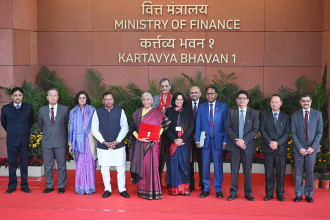
LONDON: Indian High Commissioner to the UK Vikram Doraiswami, UK's Minister of State for Security Tom Tugendhat on Thursday held discussions on bilateral and wider security cooperation between India, UK."HC @VDoraiswami met @TomTugendhat, Minister for Security, for a wide ranging discussion on bilateral and wider security cooperation," Indian High Commission in the UK tweeted on Thursday.
Doraiswami recently met Commandant Major General Zack Stenning OBE at the Royal Military Academy, Sandhurst and discussed engagements in the Professional Military Education domain.Taking to Twitter, India's High Commission in London said, "HC @VDoraiswami visited the Royal Military Academy, Sandhurst @BritishArmy on 17 Mar 2023 and had productive discussions with the Commandant Major General Zack Stenning OBE about engagements in the Professional Military Education domain."India and UK share a good relationship. Recently, both the country signed the Young Professional Scheme where Vikram K Doraiswami was also present.
The event took place at the High Commission of India in London. Further details and implementation dates will be shared soon regarding the scheme."HC @VDoraiswami & PUS Home @MatthewRycroft1 signed & exchanged the letters for formalising the Young Professional Scheme at an event @HCI_London today. Further details and implementation date will be shared soon. @MEAIndia @PIBHomeAffairs @ukhomeoffice @DoC_GoI @ANI @DDNewslive," the official handle of the High Commission of India in London tweeted.
By RSS/ANI
----
UN's global disaster alert systems goal faces uphill climb
UNITED NATIONS, UNITED STATES: How can anyone seek shelter from a natural disaster they don't even know is coming? Last year the United Nations called for every person on the planet to be covered by early warning systems by 2027 -- but months into the effort it is becoming clear that the project will require more data and expertise.
With a relatively low price tag of $3.1 billion, the UN's plan hopes to implement the simple principle of early warning systems: assess risks using meteorological data, forecast impending problems using modelling, prepare populations ahead of time, and send out alerts to those expected to be impacted.
But building out those steps poses unique issues at each turn, according to those involved in the effort, many of whom are gathered this week in New York for a historic UN conference on water-related crises.In Tajikistan, 100 years of weather data exist only on paper, chair of the country's environmental protection committee, Bahodur Sheralizoda said.Digitizing this data could provide "more precise weather forecasts" or be applied to climate modeling, he added.
"With the small investments, we can have really big impact in the long run."
To help fill the data gap, the US National Oceanic and Atmospheric Administration (NOAA) is also hoping to deploy weather stations made from 3D printers around the world, said the agency's chief scientist Sarah Kapnick.When it comes to analyzing the meteorological data and predicting future weather events, there is also a lack of local expertise, said Stefan Uhlenbrook, director of hydrology, water and cryosphere at the UN World Meteorological Organization (WMO).
"You need local capacity to run the local models," he told AFP.Some help should be coming from NOAA, which Kapnick said has plans to "train local climate forecasters and leaders."After risks are identified, getting those alerts to remote populations poses possibly the biggest hurdle."To reach the last mile... and then to get them acting and prepared is a big challenge," said Uhlenbrook.This is where the International Federation of Red Cross and RedCrescent Societies (IFRC), a WMO partner in the field, comes in.
- Regular training and drills -For IFRC Secretary General Jagan Chapagain, the country of Bangladesh should be viewed as a model to replicate. Scarred by the horrific 1970 cyclone that killed hundreds of thousands, the South Asian country has for decades built up storm-resistant shelters and warns residents of upcoming dangers, by bicycle if necessary, Chapagain told AFP.
While church bells, loudspeakers and sirens are still used as warning systems in many isolated places, alerts sent via radio, TV and SMS have become the norm.
"In 2022, 95 percent of the world's population had access to mobile broadband networks and close to 75 percent of the population owned a mobile phone," said Ursula Wynhoven with the International Telecommunications Union (ITU).That makes mobile networks "powerful communication channels" for alerts, especially because "SMS warnings can be targeted to reach only those located in an at-risk area," she added.Few developing countries have installed such systems, she said, noting a "relatively low cost."WMO chief Petteri Taalas also highlighted the cost effectiveness of setting up early warning programs, saying that "you'll get the money back at least tenfold that you invest."
He pledged at the UN Water conference to speed up implementation of the UN's 2027 goal, beginning with water-related disasters.Floods and droughts account for 75 percent of climate-related disasters, which are expected to increase further due to global warming.But simply alerting a population is not enough -- there must also be "regular training and drills," warns IFRC chief Chapagain.People must practice the processes of interpreting different signals and finding the nearest escape routes or shelter."Once people understand the logic, they manage these things better," he said.While climate change is expected to intensify storms, at the opposite extreme, it is also expected to increase the severity of droughts.
Though the potential for drought-induced disaster happens more slowly, Uhlenbrook said, warnings are still important to protect livelihoods.For example, "we had in Europe a very dry, warm winter, so the (water) reservoir levels are very low," Uhlenbrook said.Farmers near Italy's Po River who plan to plant rice, which need lots of irrigation, should take that into consideration, he explained.
NOAA's Kapnick highlighted that drought predictions, based off advanced climate modeling, are of particular importance in "developing nations with heavily agriculturally based economies.""Early warning systems based on seasonal predictions are critical for planning for food security and macro-economic forecasts," she said.
By RSS/AFP
---
Gold and silver business can be developed as a domestic industry: President Paudel
KATHMANDU: President Ramchandra Paudel has said that the gold and silver business can be developed as a domestic industry. President Paudal, while meeting with the officials of the Nepal Gold and Silver Business Federation on Friday, expressed the opinion that if the house can be developed as an industry, a lot of benefits can be gained from this business.
A delegation of the federation led by the president of the federation Manik Ratna Shakya went to the president's office in Maharajganj to congratulate the newly appointed president Ramchandra Paudel and wish him a successful tenure. In the meeting with the officials of the federation, President Paudel said that the current economic situation of the country has worried him. In that regard, he said that the state, businessmen and general consumers will benefit from running this business using domestic labor and ships.
He said that considering the economic situation of the country, everyone should bear responsibility from their respective areas. President Paudel said, "The government has not reached perfection." He said that the necessary consultations will be held to make the economy strong and effective as soon as the government is completed.
Paudel said that the government and the private sector should work together to solve the current crisis. President Paudel stressed on the need to build a self-sufficient economy by increasing production and creating jobs within the country.
During the meeting with President Paudal, the president of the federation, Shakya, promised to provide all possible support to the gold and silver businessmen for economic development and prosperity. President Shakya said that the businessmen are facing problems due to lack of raw materials and pointed out the need to focus on the export promotion of Nepali jewelery by ensuring the import of sufficient raw materials.
He opined that the state should also pay attention to the high interest rates that have had a serious impact on entrepreneurs and ordinary borrowers.
Published Date: June 1, 2023, 12:00 am
Post Comment
E-Magazine
RELATED International


-1761813258.jpg)


